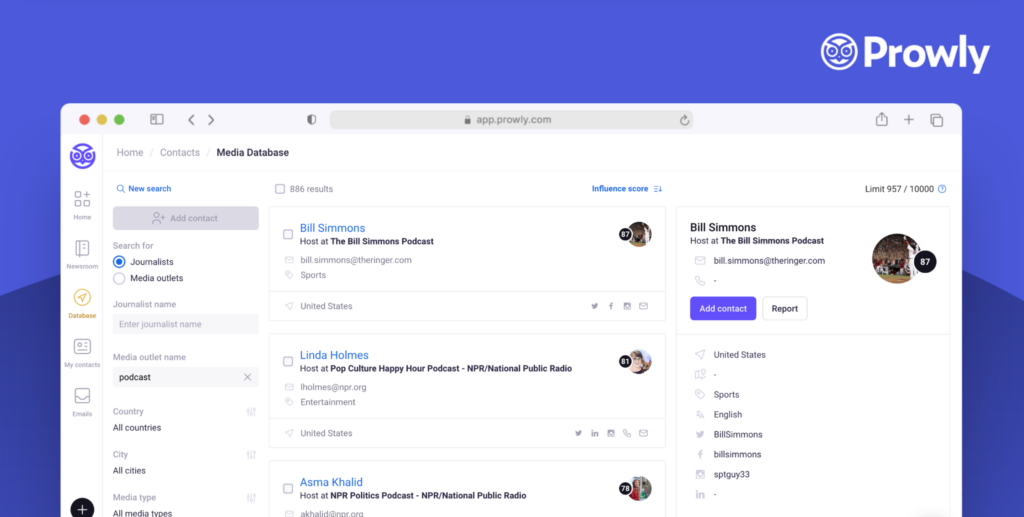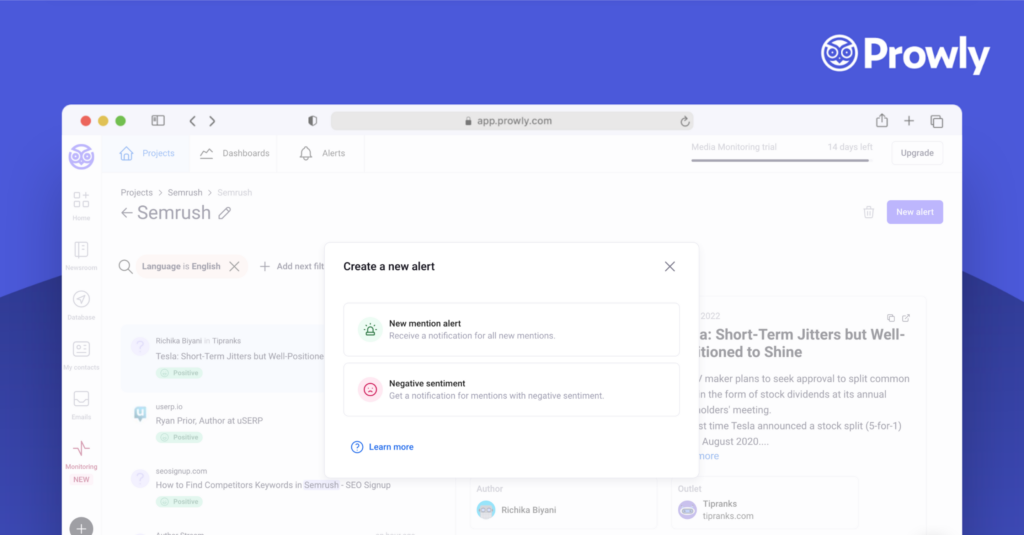One thing is constant: the media landscape is always changing. In fact, this feels more true than ever before. We’ve grown accustomed to seeing editors move regularly from one publication to the next, and freelance journalists juggle different beats based on the publications they’re currently working with.
We also know that keeping up with media contacts is essential to a successful PR strategy. A strong network of media relationships is the foundation of any PR agency or in-house team. So, it’s well worth investing the time and energy needed to maintain an up-to-date and accurate media contact database.
This task may feel like a weight on your shoulders, but you can approach it in small doses if necessary. Before you start following the advice below, remember: crafting and maintaining a small targeted list can be more powerful than using a huge catch-all media list that you haven’t updated in months. So think small if you need to.
Here are 5 useful ways to keep your media contact list fresh and current:
- Work from editable and shareable contact lists
- Follow along on social media
- Track your competition closely
- Stay in touch
- Investigate non-responders
Let’s look closely at each.
How to keep up with your media contacts
1. Work from editable and shareable contact lists
Let’s start from the beginning. Your media contact lists should be viewed as living documents, meaning that they’re never done. For this reason, they should be created in formats that allow for easy editing by everyone on your team.
Protip: Make it a habit to download and save master copies of shared documents every month in case the shared version is ever damaged.
You can use something basic and familiar like Excel or Google Sheets for these documents, including a column for topics and beats that you can search and sort on.
Then, when you notice a contact’s info has changed, either through an email or social media announcement, update the shared document so the whole team is immediately made aware.
Or, you could forward it to a person on your team delegated to updating media contacts. This person can serve as your team or agency’s media contact expert. It’s an excellent task for a PR intern or virtual assistant.
Even simpler, put the burden of contact updates on an automated PR software service and take it easy. PR tools like Prowly can do all the work for you. Their media databases are constantly updated, searchable by topics and beats, and include more media contacts than you could ever gather on your own.

They even allow you to search media contacts and create and save targeted lists for every client. Their updating work behind the scenes means that every search you run by industry and media type will result in an updated media contact list that’s just waiting for your next press announcement.
2. Follow along on social media
Social media platforms are an indispensable tool that shouldn’t be overlooked.
Many journalists make announcements about their current projects and new positions on Twitter and LinkedIn. You just need to follow them to get the updates!
You can take it a step further and personally acknowledge these move and promotion announcements by sharing them on your personal or agency feeds. Or use the opportunity to send a congratulatory note directly to the editor. This is a small but effective way to connect with a journalist.
However, keep in mind that since Musk acquired Twitter, more and more journalists have moved to alternative social media platforms. We compiled the most popular alternatives in this list.
On Twitter and LinkedIn, you can also follow client-relevant industry hashtags to learn of writers and editors covering the sectors that matter most to you.
And when it comes to influencers, you’ll need the power of social media to discover the next “stars”. There are so many emerging influencers—especially in the micro-influencer space—that could be a perfect fit for your clients.
3. Track your competition closely
You want to be covered wherever your competition is being positively recognized. So you need to follow the coverage of them closely and track who is covering them.
The easiest way to do this is to set up media monitoring alerts for your clients’ competitors, so you can see where they’re being mentioned. Make note of the writers that cover them and check them against your media contact list to make sure you have them there.

Now you’re prepared to reach out to the editor and introduce them to the work your client is doing in the same space.
Bonus: Tracking your competitors may also help you identify new media contacts you hadn’t even heard of yet.
4. Stay in touch
Journalists change beats, pick up new ones, and move to new publications frequently. You have to stay in touch to stay in the know.
There are two ways to do this. The first is to check in with editors on a regular schedule. This usually happens if you’re following a solid PR plan with consistent announcements to your targeted media list.
The second way could be to send out a monthly or quarterly blanket email to your contact list. I can hear the collective gasp, but hear me out.
If you get creative, there’s something valuable you can send your email list from time to time. Maybe it’s a humorous round-up of PR and journalist memes, or maybe it’s a useful checklist for end-of-year office organization. Think of the emails that you don’t mind receiving on a Friday afternoon, and begin to create one of those on your own.
Keep your eye on email auto-replies too, and don’t just automatically hit delete. Many editors announce their moves in them, providing a great opportunity to update your media list.
5. Investigate non-responders
There are many advantages of keeping a media contact database up-to-date. If you’ve reached out to an editor several times without a response, it may be time to admit you may be reaching out to the wrong person. Maybe they no longer cover the topic you think they do, or maybe they’ve moved on to another publication.
Identify these non-responding media contacts and search online for their latest info. Visit the publication’s website to make sure they’re still writing there. If yes, make note of their most recent article topics, because their beat may have changed. Look for them on social media to find their current title.
This investigative work will help you maintain pristine contact lists that get you a higher response rate.
The payout
Although there are many advantages of keeping a media contact database, it’s no joke to say that this ongoing maintenance work on your media contact lists is a solid time investment. You’ll want to approach it regularly, delegate it if necessary, and put it on your office calendar to make it a valued habit. It may be time to turn to PR automation software to streamline this need, too.
You’ll feel 100x better prepared for your next press announcement knowing that your media list is up-to-date and poised to reach everyone it should.
Current media contact lists mean you’ll increase your odds of email responses and decrease the number of pitches you send that frustrate editors who have moved on to other publications or beats.
It’s a tactic that keeps you true to your mission of PR professionalism, so it’s well worth the time.
Cover image by Priscilla Du Preez

